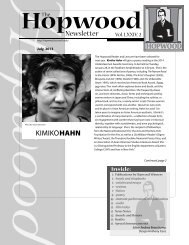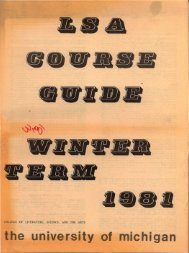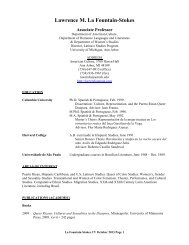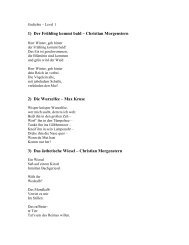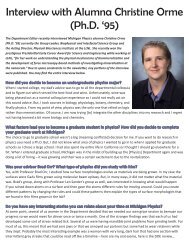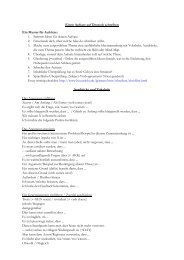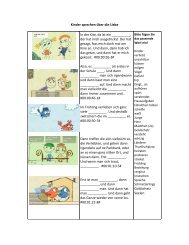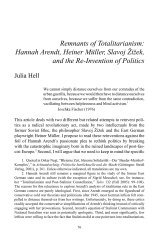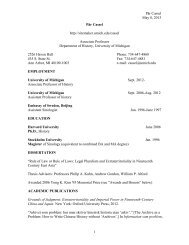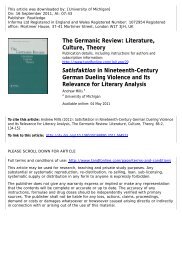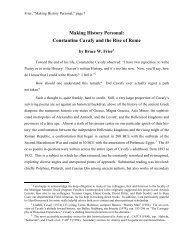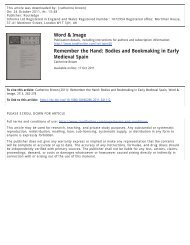Fall 2011 First-year Seminars Brochure (PDF) - College of Literature ...
Fall 2011 First-year Seminars Brochure (PDF) - College of Literature ...
Fall 2011 First-year Seminars Brochure (PDF) - College of Literature ...
Create successful ePaper yourself
Turn your PDF publications into a flip-book with our unique Google optimized e-Paper software.
Introduction<br />
“I absolutely loved my <strong>First</strong>-Year Seminar in sociology and black history<br />
and was excited to go every week. I really enjoyed the subject, and I loved how<br />
my pr<strong>of</strong>essor took time to get to know each <strong>of</strong> his students and our interests.<br />
He made it a point to tell me when he found material that was pertinent to<br />
my own term paper research, showing that he gave a lot <strong>of</strong> thought to what we<br />
wrote about and wanted to help us to do well in his class.<br />
<strong>First</strong>-Year <strong>Seminars</strong> are courses<br />
limited to 20 students, providing an<br />
excellent chance to engage faculty on a<br />
more personal basis and to fulfill at least<br />
one <strong>of</strong> your LSA requirements.<br />
Humanities (HU) pg 1<br />
<strong>First</strong>-Year Writing (FYWR) pg 9<br />
Interdisciplinary (ID) pg 12<br />
Math & Symbolic Analysis (MSA)<br />
Quantitative Reasoning (QR1) pg 13<br />
Natural Science (NS) pg 14<br />
Social Science (SS) pg 16<br />
FYS Quick Reference Guide pg 21
Arabic, Armenian, Persian, Turkish &<br />
Islamic studies<br />
AAPTIS 192.001 Religion & Revolutions: A Comparison<br />
<strong>of</strong> the French, Russian, Turkish & Iranian Cases<br />
Erdem Cipa<br />
This course raises central questions concerning the struggle<br />
between the perceived dogma <strong>of</strong> religion, freedom <strong>of</strong> thought, and<br />
conscience. Is it possible to have a “secular” world? Is it still possible<br />
to have a unified “religious” vision? What is the relationship <strong>of</strong><br />
“religion” to a “secular” state or to a “secular” public? At a time<br />
when religious traditions are obliged to relate to each other, how<br />
can they do so in a constructive and creative fashion, without<br />
descending into violence? What is the relationship between religion<br />
and revolution? Is religion on the way out, or is it on the way<br />
in? What contributes to the phenomenal rise in fundamentalist<br />
commitment in so many places? Are there exceptions? Are we<br />
condemned to have a Star Wars like “clash <strong>of</strong> civilizations” between<br />
Islam and the West? Meets with HISTORY 197.004. MW 2:30-4<br />
Looking to improve your research skills?<br />
Try this mini-course for first-<strong>year</strong> students...<br />
UC 174 Digital Research: Critical Concepts & Strategies<br />
This 1-credit, hands-on course helps lay a solid foundation for<br />
success in doing current and future academic research in all<br />
disciplines: Humanities, Natural Science, and Social Science.<br />
With an emphasis on the wealth <strong>of</strong> digital resources now<br />
available, it focuses on information discovery, management<br />
skills, knowledge <strong>of</strong> scholarly sources, and critical thinking.<br />
Though most incoming students have done online and library<br />
research before, many find it beneficial to learn how to use<br />
other resources, such as ProQuest, Mirlyn, and Ref Works.<br />
Humanities<br />
Afroamerican & African Studies<br />
AAS 104.002 Introduction to the Black Novel 1950–1990<br />
Magdalena Zaborowska<br />
This course explores the development <strong>of</strong> the novel by African-<br />
American writers in the second half <strong>of</strong> the 20th century. Authors<br />
include Gwendolyn Brooks, Ann Petry, James Baldwin, Ralph<br />
Ellison, Richard Wright, and Toni Morrison. Close readings will<br />
be combined with hands-on critical approaches to literature as we<br />
discuss issues such as: genre; social constructions <strong>of</strong> race, gender and<br />
sexuality; class; and social space. TTh 1-2:30<br />
AAS 104.003 The Culture <strong>of</strong> Jazz<br />
Paul Anderson<br />
“There is more to jazz than music,” a scholar recently wrote, “and<br />
it is there, paradoxically, that its influence is pr<strong>of</strong>ound.” “Jazz,” he<br />
continued, “is also a loosely connected set <strong>of</strong> ideas: it has a history<br />
and a tradition <strong>of</strong> thought, an imagery and a vocabulary that have<br />
given it reality and presence.” This first-<strong>year</strong> seminar follows up<br />
on those very ideas. We will explore a few elements <strong>of</strong> the music,<br />
culture, and literature <strong>of</strong> jazz. We will be especially attentive to jazz’s<br />
relationship to African American cultural and intellectual life in the<br />
20th century and also track the music’s relationship to American<br />
musical culture more broadly. Although the full history <strong>of</strong> the music<br />
covers more than a century and reaches across the world, our focus<br />
will be on the culture <strong>of</strong> modern jazz in the 1950s and 1960s and<br />
some <strong>of</strong> that era’s major figures, such as Miles Davis, John Coltrane,<br />
and Billie Holiday. MW 2:30-4<br />
page 1
American Culture<br />
AMCULT 103.001 Critical Genealogies <strong>of</strong> American Musics<br />
Amy Stillman<br />
Throughout the 20th century, both scholarship and commerce have<br />
shaped “American music” and “American musical life” in racially<br />
binary terms—namely, white and black. This seminar will examine<br />
music production, marketing, consumption, and journalism in<br />
the United States through the lens <strong>of</strong> a racial politics <strong>of</strong> culture.<br />
How can we account for both inclusions and exclusions within<br />
constructions <strong>of</strong> “American music” and “American musical life”?<br />
This seminar combines readings from multiple disciplines, listening<br />
assignments, and viewing <strong>of</strong> documentary films. MW 11:30-1<br />
AMCULT 103.002 History through <strong>Literature</strong><br />
Penny Von Eschen<br />
We take a broad sweep through the epic transformations in the<br />
United States and its intersection with the broader world over<br />
the past century through reading historical fiction and one work<br />
<strong>of</strong> science fiction. We’ll identify and talk about the historical<br />
transformations, political and social conflicts, and pr<strong>of</strong>ound ethical<br />
issues faced by characters in these books. The class is primarily<br />
discussion based, but we will sometimes augment the reading with<br />
film or music, drawing on cultural references within the novels or<br />
film adaptations. Meets with HISTORY 197.003. MW 8:30-10<br />
AMCULT 103.003 Say it Loud: Black Culture in America<br />
Stephen Berrey<br />
The Afro. The zoot suit. Hip Hop. Ma Rainey. Boondocks. Aretha<br />
Franklin. James Brown. Each <strong>of</strong> these cultural items is tied not only<br />
to personal taste or entertainment value but also to larger political<br />
and social issues around race. In this course, we will analyze Black<br />
expressive culture (such as in music, art, literature, and television)<br />
and Black everyday culture (such as through hair, fashion, and<br />
language), and seek answers to two broad questions: What is the<br />
relationship between Black culture and the Black freedom struggle?<br />
What is the relationship between “Black” culture and “American”<br />
culture? Meets with HISTORY 197.003. TTh 10-11:30<br />
Humanities<br />
AMCULT 103.004 Race in U.S. Popular Culture<br />
Anthony Mora<br />
The United States has always been a racially and culturally diverse<br />
nation, but the meaning <strong>of</strong> that heterogeneity has been fiercely<br />
debated. This seminar examines how racial representations<br />
intersected with assumptions about gender, sexuality, economic<br />
class, and national belonging over the past 150 <strong>year</strong>s. Rather than<br />
focusing on constructing a time line <strong>of</strong> events, we explore how<br />
race influenced the representations <strong>of</strong> particular groups, including<br />
whites, African Americans, Latinos, Native Americans, and Arab<br />
Americans. We read popular media (including novels, films, comic<br />
books, etc.) as a primary historical source. MW 2:30-4<br />
Asian Studies<br />
ASIAN 251.001 The Story <strong>of</strong> the Stone<br />
David Rolston<br />
In this class we will try together to get a better understanding <strong>of</strong><br />
traditional Chinese culture by reading and discussing a novel that<br />
has been praised as a veritable encyclopedia <strong>of</strong> Chinese life that has<br />
mattered deeply to countless Chinese readers, some <strong>of</strong> whom reread<br />
it <strong>year</strong> after <strong>year</strong>. Because The Story <strong>of</strong> the Stone focuses on life<br />
within the household and the majority <strong>of</strong> its major characters are<br />
female, one <strong>of</strong> the foci is the life <strong>of</strong> Chinese women during the time<br />
the novel was written. Class meetings feature a number <strong>of</strong> different<br />
activities that encourage students to gain a wider and richer view <strong>of</strong><br />
the novel and the culture that produced it. MWF 9-10
ASIAN 254.001 Popular Culture & Korean Society<br />
Young ju Ryu<br />
Following the Korean War, South Korea underwent an economic<br />
development that transformed the country from one <strong>of</strong> the<br />
poorest nations in the world to one <strong>of</strong> the world’s dozen largest<br />
economies. How do we begin to understand what such a change<br />
must have meant for the people living through it? This seminar<br />
examines popular culture as a means <strong>of</strong> accessing values, desires,<br />
and structures that sustain people’s lives in time <strong>of</strong> great upheaval.<br />
It focuses on how popular cultural forms construct, represent, or<br />
contest dominant ideas about Korean history, national identity, and<br />
gender norms. TTh 4-5:30<br />
Classical Civilization<br />
CLCIV 120.001 Great Speeches Ancient & Modern<br />
Sara Forsdyke<br />
Have you ever been inspired by a great speech or wondered how<br />
great speakers from Abraham Lincoln to Barack Obama perform<br />
their magic? Is the power <strong>of</strong> persuasive speech a matter <strong>of</strong> inborn<br />
charisma? Or can people learn techniques <strong>of</strong> effective public<br />
speaking, as the ancient Greeks and Romans believed? In this<br />
course, we will learn from the ancients by studying one ancient<br />
handbook <strong>of</strong> public speaking (Aristotle’s Rhetoric) alongside<br />
selected great speeches from the ancient and modern world. In<br />
the final part <strong>of</strong> the course, we will apply the techniques <strong>of</strong> public<br />
speaking to write our own speeches. MW 1-2:30<br />
CLCIV 120.002 Clubs in Antiquity<br />
Kweku Garbrah<br />
This seminar is a study <strong>of</strong> voluntary associations in Greek and<br />
Roman societies. These include religious, secular, pr<strong>of</strong>essional, and<br />
social clubs. TTh 4-5:30<br />
Comparative <strong>Literature</strong><br />
Humanities<br />
COMPLIT 140.001 Welcome to the Twentieth Century<br />
Tatjana Aleksic<br />
Welcome to the ride through the most diverse and wonderful<br />
literary and artistic era! We survey the literary and artistic<br />
movements <strong>of</strong> the past century and consider them in context with<br />
historical developments at the time. Departing from the wild<br />
experimentations with language and form put forth by the historical<br />
avant-gardes from the beginning <strong>of</strong> the century, our journey takes us<br />
through the post-WWII disillusionment <strong>of</strong> Theatre <strong>of</strong> the Absurd<br />
to postmodern fragmentation <strong>of</strong> text and image. In addition to some<br />
<strong>of</strong> the most important names <strong>of</strong> European and American literature<br />
and art, look for many unexpected texts from the world’s “cultural<br />
peripheries,” intended to give a rounded idea <strong>of</strong> how Western ideas<br />
were disseminated to other parts <strong>of</strong> the globe. TTh 11:30-1<br />
Dutch Studies<br />
DUTCH 160.001 Colonialism & its Aftermath<br />
Antonius Broos<br />
The Netherlands has been an active participant in shaping the world<br />
as we know it, through mercantile and political involvement around<br />
the globe: colonizing the islands <strong>of</strong> Indonesia, founding New<br />
Amsterdam/New York, settling South Africa’s Capetown, and first<br />
trading with the Japanese. The Netherlands held colonial power<br />
over Suriname until 1975; other West Indies islands, i.e., Aruba,<br />
Bonaire, Curaçao are still part <strong>of</strong> the Dutch Kingdom. By reading<br />
Dutch literary works from as early as the 17th century, we explore<br />
Dutch expansion and how countries were conquered and political<br />
systems established. We focus in particular on mercantile gains in<br />
the spice trade and involvement in the slave trade. (HU/R&E) TTh<br />
2:30-4<br />
page 3
English<br />
ENGLISH 140.001 Shakespeare in Performance<br />
Steven Mullaney<br />
This seminar intensively studies four plays, with a special<br />
emphasis on the ways in which performance embodies meaning.<br />
Reading includes A Midsummer Night’s Dream, The Merchant <strong>of</strong><br />
Venice, Hamlet, King Lear, Macbeth, and/or Othello. How does<br />
performance work as a fundamental mode <strong>of</strong> signification? Students<br />
develop skills by watching both filmed and live performances<br />
and exploring play-texts as imagined performances. In addition<br />
they bring a theatrical and textual perspective to questions<br />
about individual words, lines, and speeches, verbal and physical<br />
interactions among characters, stage directions, props, audience,<br />
and stage design. The goal is to have a firm grasp <strong>of</strong> the traditions<br />
<strong>of</strong> theatrical performance in Shakespeare’s plays and an enhanced<br />
familiarity with some <strong>of</strong> the basic research tools in literature and<br />
theater. TTh 8:30-10<br />
ENGLISH 140.002 Arthurian <strong>Literature</strong><br />
Karla Taylor<br />
Arthurian literature has exerted an enduring fascination for<br />
audiences and readers for nearly 1500 <strong>year</strong>s. This course samples a<br />
variety <strong>of</strong> versions <strong>of</strong> Arthurian characters and stories, both serious<br />
and comic: war heroes <strong>of</strong> early Welsh folktale; the ideal chivalric<br />
society <strong>of</strong> high medieval romance (where many <strong>of</strong> our modern ideas<br />
<strong>of</strong> love originated); Malory’s full cycle (from the Sword in the Stone<br />
through Lancelot and Guinevere; the quest for the Holy Grail; the<br />
downfall <strong>of</strong> the Round Table and otherworldly end <strong>of</strong> Arthur, the<br />
“once and future king”); and modern appropriations in works such<br />
as Mark Twain’s Connecticut Yankee in King Arthur’s Court and<br />
Monty Python’s Monty Python and the Holy Grail. MW 10-11:30<br />
ENGLISH 140.004 City Lit<br />
Andrea Zemgulys<br />
Humanities<br />
This course studies the emergence and flowering <strong>of</strong> modernism—a<br />
movement that aimed to revolutionize literature in the late 19th and<br />
early 20th centuries—by tracking its development as a response to<br />
the growth <strong>of</strong> cities and normalization <strong>of</strong> urban experience. Many<br />
writers seized upon London, Paris, and Berlin as settings for their<br />
lives and works integral to their formal experiments. What did the<br />
city <strong>of</strong>fer these writers? How did their writings register the novelty<br />
<strong>of</strong> the “urban” at that time, and how do they capture its experience<br />
today? Readings include short stories, novels, and poetry by writers<br />
from the late 1800s and early 1900s, including Edgar Allan Poe,<br />
Charles Baudelaire, T.S. Eliot, Virginia Woolf, E.M. Forster, James<br />
Joyce, and Katherine Mansfield. TTh 1-2:30
French<br />
FRENCH 244.001 Issues in Race & Cultural Diversity in<br />
the Francophone World<br />
Frieda Ekotto<br />
This seminar concentrates on cultural productions and social issues<br />
related to race, racism and ethnicity in French-speaking societies.<br />
At one level, we discuss how discourses on race function within the<br />
general ideological state apparatuses that reproduce a given social<br />
order. At another level, we analyze how discourses on race, racism,<br />
ethnicity, gender and social class are inscribed in a selection <strong>of</strong> texts<br />
and films. We also examine the implications <strong>of</strong> cultural diversity in<br />
different parts <strong>of</strong> the Francophone world. TTh 10-11:30<br />
German<br />
GERMAN 180.001 The Third Reich & its Legacies<br />
Julia Hell<br />
In this course, we will explore the history, politics, and culture<br />
<strong>of</strong> the period ranging from 1943 to 1989, which includes the<br />
beginning <strong>of</strong> the end <strong>of</strong> the Third Reich and the beginning <strong>of</strong> the<br />
so-called Berlin Republic, i.e., Germany after the fall <strong>of</strong> the Berlin<br />
wall. How have politicians, public intellectuals, and artists in the<br />
two postwar Germanies thought about the National Socialist<br />
prehistory <strong>of</strong> the country? Readings will include a mixture <strong>of</strong><br />
literary and non-literary German and English texts. MW 11:30-1<br />
Humanities<br />
Hebrew And Jewish Cultural Studies/<br />
Judaic Studies<br />
HJCS 192.001/JUDAIC 150.001 Old-New Lands: Jewish<br />
Immigration in <strong>Literature</strong> & Film<br />
Maya Barzilai<br />
What does it mean to become a refugee or immigrant? What<br />
is lost and gained in the process <strong>of</strong> relocation? To explore these<br />
questions, we look at representations <strong>of</strong> Jewish immigrants in<br />
modern literature and film. During the 19th and 20th centuries,<br />
millions <strong>of</strong> Jews either chose to leave Central and Eastern Europe<br />
or were forced to do so because <strong>of</strong> political, social, and economic<br />
circumstances. They immigrated primarily to the United States,<br />
Palestine, or Western Europe. Reading texts in translation from<br />
Hebrew, German, Polish, and Yiddish, we discuss the significance <strong>of</strong><br />
modes <strong>of</strong> transportation and spaces <strong>of</strong> transit, such as boats, trains,<br />
airplanes, train stations, hotels, boarding houses, elevators, and even<br />
suitcases. What kinds <strong>of</strong> encounters take place en route in these<br />
various spaces or upon arrival in the “old-new” lands <strong>of</strong> America or<br />
Palestine/Israel? MW 2:30-4<br />
History<br />
HISTORY 197.001 Modern British History in Fiction<br />
Kali Israel<br />
This seminar examines contemporary British fiction using history as<br />
a theme, rather than simply a setting. These works are not set simply<br />
in some bygone age, but explore memory, representation, gaps,<br />
contestations, and what counts as knowledge. Students read these<br />
books as serious contributions to historical writing, imaginatively<br />
exploring both the complexity <strong>of</strong> the past and the ways it may haunt<br />
the present. What kinds <strong>of</strong> history are represented? How do authors<br />
show relationships between different histories? What are the risks<br />
<strong>of</strong> historical fiction? How does fiction allow us to think about the<br />
question: What is history? T 10-1<br />
page 5
HISTORY 197.002 The Long Civil Rights Movement<br />
from World War II to Present<br />
Kevin Gaines<br />
Historians have recently used the phrase “the Long Civil Rights<br />
Movement” to emphasize the alliance between civil rights<br />
organizations and the labor movement in struggles against racial<br />
discrimination dating back to the 1930s and 1940s . The phrase<br />
also describes recent scholarship on the evolving nature <strong>of</strong> battles<br />
for equality in the urban North, as well as the Deep South during<br />
the late 1960s and 1970s. We also explore their relationship to<br />
the Women’s movement, the antiwar movement, and the youth<br />
counterculture. Through a selection <strong>of</strong> diverse genre (literature,<br />
film, drama, popular music), we will discuss the history and legacy<br />
<strong>of</strong> this movement. MW 2:30-4<br />
HISTORY 197.003 Say it Loud: Black Culture in America<br />
Stephen Berrey<br />
The Afro. The zoot suit. Hip Hop. Ma Rainey. Boondocks. Aretha<br />
Franklin. James Brown. Each <strong>of</strong> these cultural items is tied not only<br />
to personal taste or entertainment value but also to larger political<br />
and social issues around race. In this course, we will analyze Black<br />
expressive culture (such as in music, art, literature, and television)<br />
and Black everyday culture (such as through hair, fashion, and<br />
language), and seek answers to two broad questions: What is the<br />
relationship between Black culture and the Black freedom struggle?<br />
What is the relationship between “Black” culture and “American”<br />
culture? Meets with AMCULT 103.003. TTh 10-11:30<br />
Humanities<br />
HISTORY 197.004 Religion & Revolutions: A<br />
Comparison <strong>of</strong> the French, Russian, Turkish & Iranian<br />
Cases<br />
Erdem Cipa<br />
This course raises the central questions concerning the struggle<br />
between the perceived dogma <strong>of</strong> religion, freedom <strong>of</strong> thought, and<br />
conscience. Is it possible to have a “secular” world? Is it still possible<br />
to have a unified “religious” vision? What is the relationship <strong>of</strong><br />
“religion” to a “secular” state or to a “secular” public? At a time<br />
when different religious traditions are obliged to relate more<br />
closely, how can they do so in a constructive and creative fashion,<br />
without descending into violence? What is the relationship between<br />
religion and revolution? Is religion on the way out, or is it on the<br />
way in? What contributes to the phenomenal rise in fundamentalist<br />
commitment in so many places? Are we condemned to have a Star<br />
Wars like “clash <strong>of</strong> civilizations” between Islam and the West? Meets<br />
with AAPTIS 192.001. MW 2:30-4<br />
HISTORY 197.005 Race in U.S. Popular Culture<br />
Anthony Mora<br />
The U.S. has always been a racially and culturally diverse nation,<br />
but the meaning <strong>of</strong> that heterogeneity has been fiercely debated.<br />
This seminar centers on building critical interpretative skills<br />
in considering racial representations in U.S. popular culture<br />
over the past 150 <strong>year</strong>s. Rather than constructing a time line <strong>of</strong><br />
events, we explore how changing ideas about race influenced the<br />
representations <strong>of</strong> particular groups, including whites, African<br />
Americans, Latinos, Native Americans, and Arab Americans. We<br />
also learn to read popular media (including novels, films, comic<br />
books, etc.) as another primary historical source. Our focus is how<br />
racial representations intersect with assumptions about gender,<br />
sexuality, economic class, and national belonging. MW 2:30-4
HISTORY 197.006 Inventing the Seaside<br />
Pamela Ballinger<br />
This seminar explores changes in our understanding <strong>of</strong> the sea<br />
and coastline in different cultures and historical moments. What<br />
cultural meanings have been attached to the sea? What role has the<br />
sea played in the imagination? As a site for social relationships?<br />
Particular attention is given to fashioning the beach as a space <strong>of</strong><br />
health, leisure, and tourism, as well as tensions between tourism and<br />
other economic activities centered around the sea. TTh 10-11:30<br />
HISTORY 197.007 Making <strong>of</strong> the Modern University<br />
Tomoko Masuzawa<br />
Despite the medieval founding <strong>of</strong> some venerable institutions<br />
in Europe (and the architectural imitation <strong>of</strong> many American<br />
ones), the university as we know it is a modern institution. Every<br />
research university that exists today was either newly founded or<br />
radically reformed during the 19th century. Why, and how, did this<br />
transformation occur? What has been the university’s relation to<br />
the state and Christian church? This course will examine the history<br />
<strong>of</strong> the university from the 12th century to the present, focusing<br />
particularly on the crucial period <strong>of</strong> its re-invention in the 19th. We<br />
will also consider the significance <strong>of</strong> the founding <strong>of</strong> the University<br />
<strong>of</strong> Michigan in the larger context. The students will be introduced<br />
to some <strong>of</strong> the foundational skills and methods <strong>of</strong> historical<br />
research, utilizing both physical and digital archives. TTh 11:30-1<br />
HISTORY 197.008 History through <strong>Literature</strong><br />
Penny Von Eschen<br />
Through reading historical fiction (and one work <strong>of</strong> science fiction),<br />
this course takes a broad sweep through the epic transformations<br />
in the United States and its intersection with the broader world<br />
over the past century. We identify and talk about historical<br />
transformations, political and social conflicts, and pr<strong>of</strong>ound ethical<br />
issues faced by characters in these books. The class is primarily<br />
discussion based, but we sometimes augment the reading with film<br />
or music, drawing on cultural references within the novels or film<br />
adaptations. Meets with AMCULT 103.002. MW 8:30-10<br />
History Of Art<br />
Humanities<br />
HISTART 194.001 The Archbishop’s Bones: Art,<br />
Architecture, & Pilgrimage at Canterbury Cathedral<br />
Achim Timmermann<br />
On 29 December 1170, Thomas Becket, Archbishop <strong>of</strong> Canterbury,<br />
was murdered in his own cathedral. Fifty <strong>year</strong>s later, Canterbury<br />
Cathedral had become one <strong>of</strong> the major centers <strong>of</strong> pilgrimage in<br />
western Christendom, drawing pilgrims from all over Europe,<br />
like those described in Chaucer’s Canterbury Tales. We explore<br />
the extraordinary story <strong>of</strong> Becket’s martyrdom, the posthumous<br />
veneration <strong>of</strong> his relics, and above all, the magnificent architecture<br />
and stained glass <strong>of</strong> Canterbury Cathedral. Students are introduced<br />
to the spatial lay-out, structure, function and imagery <strong>of</strong> a<br />
great Gothic church, thus sharpening their skills <strong>of</strong> visual and<br />
architectural analysis. You will also learn how to read primary<br />
textual sources (such as contemporary accounts <strong>of</strong> Becket’s murder),<br />
and secondary literature (such as a scholarly article analyzing<br />
medieval imagery depicting Becket’s murder). T 1-4<br />
Linguistics<br />
LING 102.001 Pronunciation <strong>of</strong> English<br />
San Duanmu<br />
This seminar explores linguistic theories and techniques in<br />
analyzing pronunciation, using English as the primary example.<br />
Using computer instruments, it also objectively compares English<br />
with other languages and looks at how to evaluate “foreign accents.”<br />
There are no prerequisites for this course. TTh 2:30-4<br />
page 7
LING 102.002 Language & Sexuality<br />
Robin Queen<br />
This course explores the use <strong>of</strong> language in relation to sexuality,<br />
with particular emphasis on the development <strong>of</strong> sexual identities.<br />
We consider how speakers point to socially relevant notions <strong>of</strong><br />
sexuality using different aspects <strong>of</strong> language, such as narrative, word<br />
choice, and pronunciation. Discussions include issues such as sexual<br />
orientations and behavioral categories, represented by words such<br />
as slut, stud, or prude. We consider the relationship <strong>of</strong> language and<br />
sexual identity to expressions <strong>of</strong> desire and how both language and<br />
sexual identities intertwine with other salient ways <strong>of</strong> interacting in<br />
the social world in areas <strong>of</strong> gender, social status and class, ethnicity,<br />
and other kinds <strong>of</strong> cultural affiliations. MW 10-11:30<br />
Philosophy<br />
PHIL 196.003 Reasoning with Rand<br />
Eric Lormand<br />
In this seminar students can harness an interest in Ayn Rand’s<br />
novels or argumentative works (i.e., “Objectivism”) for a ride into<br />
the world <strong>of</strong> philosophy (or, vice versa). Rand seeks to support a<br />
wide-ranging set <strong>of</strong> philosophical conclusions and applies them<br />
systematically to many important practical issues. Among her<br />
conclusions: all human knowledge rests on a few basic certainties<br />
(akin to “foundationalism”); the external world, and even moral<br />
facts, exist independently <strong>of</strong> any views about them (akin to<br />
“realism”); the meaning <strong>of</strong> a word or concept depends on vastly<br />
more than its so-called definition (akin to “holism”); one’s own<br />
rational life is the proper fundamental standard <strong>of</strong> moral value<br />
(akin to “egoism”); and private property and minimal government<br />
regulation form the best social system (akin to “capitalist<br />
libertarianism”). While her conclusions are interesting and may<br />
seem initially attractive, they invite many serious criticisms and<br />
defenses. TTh 4-5:30<br />
Humanities<br />
“Great course, great teacher.<br />
This class really helped me feel<br />
comfortable in college.<br />
“The pr<strong>of</strong>essor taught me<br />
a great deal about myself, my<br />
relationships, and life in general.
Classical Civilization<br />
CLCIV 121.001 Objects Surviving from Greek & Roman<br />
Antiquity<br />
<strong>First</strong>-Year Writing Requirement<br />
Lisa Nevett<br />
In the contemporary world we surround ourselves with objects.<br />
The items we select say much about us and about how we wish to<br />
be viewed by others. But at the same time, each object has its own<br />
history and its own place and significance within the complex web<br />
<strong>of</strong> contemporary culture. In this course we consider some examples<br />
<strong>of</strong> objects surviving from Greek and Roman antiquity, exploring<br />
their individual histories and what they may have to say about the<br />
cultures <strong>of</strong> which they were a part. Our starting point will be the<br />
objects themselves, but as we seek to contextualize and understand<br />
them we will be sampling a much wider range <strong>of</strong> ancient source<br />
materials, including ancient texts in translation. TTh 10-11:30<br />
English<br />
ENGLISH 125.014 Islam in the Indian Ocean through<br />
Different Genres<br />
Daniel Birchok<br />
Our readings will focus on writings on the topic <strong>of</strong> Islam and<br />
Muslims in the Indian Ocean since the 14th century, works<br />
authored by Muslims and non-Muslims and including the accounts<br />
<strong>of</strong> travelers, colonial and post-colonial ethnographies, and a novel.<br />
These sources all use different evidence, strategies, and rhetorical<br />
styles to describe the space <strong>of</strong> the Indian Ocean and make<br />
arguments about it, which helps us reflect on how we do these<br />
things in our own writing. Because many historians argue that the<br />
beginning <strong>of</strong> this period represents the opening <strong>of</strong> modern systems<br />
<strong>of</strong> exchange and politics, this topic helps us think about the ways<br />
in which Islam is represented in writing and other media today.<br />
MW 4-5:30<br />
ENGLISH 125.027 Gossip: Talking Across the Disciplines<br />
Andrea McDonnell<br />
This seminar will investigate the notion <strong>of</strong> gossip: who does it,<br />
when does it occur, and how do we recognize it? We will draw<br />
upon material from a variety <strong>of</strong> disciplines, including sociology,<br />
anthropology, women’s studies, and communications, in order to<br />
investigate the ways in which gossip has been studied. Through<br />
this literature, along with popular novels, television programs, and<br />
tabloid magazines, we will investigate the social functions <strong>of</strong> gossip,<br />
the gendered discourse that surrounds this form <strong>of</strong> speech, and the<br />
potential political implications that gossip brings to bear in our<br />
contemporary media landscape. MW 2:30-4<br />
ENGLISH 125.033 Tuning In: Finding Meaning in Music<br />
Richard Blim<br />
From a perfect playlist to a national anthem, music matters. We<br />
will examine the various roles music plays in our lives and how<br />
music carries such emotional and personal power. Topics will range<br />
from personal encounters with music to its role in broader social<br />
identities and its practical, political, and ethical applications.<br />
Writing assignments will require students to approach music from<br />
a variety <strong>of</strong> angles, and may include shorter reactions to readings<br />
and musical examples, first-hand accounts, position papers,<br />
and research-based analysis. Knowledge <strong>of</strong> music and musical<br />
terminology will be helpful but is not required. MW 10-11:30<br />
ENGLISH 125.035 Perspectives on Consumer Culture<br />
Katherine Brion<br />
What makes us consumers? In what way do our various activities<br />
participate in consumerism? We will attempt to answer these<br />
questions and others as we examine texts, images and other media<br />
that comment on and constitute past and present consumer<br />
cultures. These will include pertinent theoretical texts (by authors<br />
such as Karl Marx and Jean Baudrillard), academic studies, literary<br />
works and artistic movements. The goal <strong>of</strong> this course is to develop<br />
your academic writing skills, so we will be engaging this topic<br />
through a variety <strong>of</strong> writing approaches/genres, such as free writes,<br />
formal essays, peer review, and revision. MW 10-11:30<br />
page 9
<strong>First</strong>-Year Writing Requirement<br />
ENGLISH 125.045 Case Studies in Writing Across<br />
Disciplines<br />
Cameron Gibelyou<br />
This seminar will explore what it means to write well in the context<br />
<strong>of</strong> several different subjects that you may explore in more detail<br />
during your time at U-M. We will read case studies <strong>of</strong> good writing<br />
from the natural sciences, social sciences, and humanities, and try<br />
to understand what makes for strong writing in each <strong>of</strong> these broad<br />
disciplinary areas. TTh 1-2:30<br />
ENGLISH 125.064 Exploring Perception through Writing<br />
David Medeiros<br />
The way in which our beliefs about the world are shaped by human<br />
perception has been a central topic in fields such as philosophy,<br />
fiction, and, more recently, cognitive science. Using this topic as our<br />
intellectual anchor, students will be expected to produce writing<br />
in various genres, such as literary essays and lab reports. Various<br />
strategies such as peer review, revision, and exploration <strong>of</strong> writing<br />
mechanics will be employed with the ultimate goal <strong>of</strong> creating<br />
articulate and self-aware writers who are prepared for any discipline.<br />
MW 2:30-4<br />
ENGLISH 125.093 Writing the Visual: Anime, Manga,<br />
and the Place <strong>of</strong> “Low” Culture in “Higher” Education<br />
Brian Dowdle<br />
What if I told you the Final Fantasy videogame series was one <strong>of</strong><br />
the greatest works <strong>of</strong> world literature in the past twenty <strong>year</strong>s?<br />
Would you agree or disagree? How could you convince a skeptical<br />
reader that Ghost in the Shell is more pertinent to our times than<br />
Shakespeare? While practicing academic writing, we will assert the<br />
value and importance <strong>of</strong> popular culture as an object <strong>of</strong> academic<br />
study. We will read essays on cultural theory and address current<br />
trends such as cyberpunk and steampunk, while learning the writing<br />
skills needed to help you succeed in college. Students are invited to<br />
explore their own cultural interests from hip-hop to video games by<br />
creating a writing portfolio. TTh 10-11:30<br />
Slavic Languages And <strong>Literature</strong>s<br />
SLAVIC 151.001 Prague: The Magic City<br />
Jindrich Toman<br />
Prague, the capital <strong>of</strong> the Czech Republic, belongs to those<br />
European cities that fascinate as unique historical amalgams whose<br />
composition defies disciplinary boundaries. The course traces<br />
Prague’s history, culture, architecture, the symbiosis <strong>of</strong> ethnic<br />
groups within its walls, and its current spirit. Prague is viewed in<br />
various ways: a medieval city; the center <strong>of</strong> religious reformation;<br />
the center <strong>of</strong> arts and science, but also alchemy and black magic,<br />
in the early modern times; an architectural project <strong>of</strong> the baroque<br />
period; a center <strong>of</strong> the Czech nationalist revival; a center <strong>of</strong> music;<br />
the city <strong>of</strong> Jews; and last but not least the showcase <strong>of</strong> modernism in<br />
the 20th century. Students read literature inspired by Prague, such<br />
as Neruda, Kafka, and Apollinaire, study visual documents, and<br />
watch films such as Paul Wegener’s Golem. MW 4-5:30<br />
SLAVIC 151.002 Yiddish Love Stories<br />
Mikhail Krutikov<br />
What was the place <strong>of</strong> love in traditional Jewish society? Did young<br />
Jewish men and women fall in love? How did ideas about love,<br />
romance, and marriage change with time? We will address these and<br />
other important questions about Jewish life by looking closely at a<br />
series <strong>of</strong> stories written in Yiddish in the 19th and 20th centuries<br />
in Russia, Poland, and America. We will explore the ways Yiddish<br />
writers portrayed romantic feelings, study their literary techniques<br />
and devices, and create our own interpretations <strong>of</strong> their works.<br />
We will read and discuss stories by the classic authors <strong>of</strong> Yiddish<br />
literature, including Mendele Moykher Sforim, Sholem Aleichem,<br />
and Y.L. Peretz, as well as their younger followers and opponents,<br />
including Dovid Bergelson, Sholem Asch, Y. Singer, Rokhl Korn,<br />
and Kadya Molodowsky. We will also look at visual representations<br />
<strong>of</strong> love in art and cinema. MW 2:30-4
<strong>First</strong>-Year Writing Requirement<br />
SLAVIC 151.003 DUI (Discourse Under the Influence):<br />
An Introduction to Narratology<br />
Benjamin Pal<strong>of</strong>f<br />
Narratology, or the study <strong>of</strong> narrative structure, considers the<br />
devices writers use to manipulate how we perceive the world<br />
as represented in words. Students examine especially striking<br />
instances <strong>of</strong> this manipulation in novels, poems, and essays in<br />
which a rational, calculating author convinces us that we are seeing<br />
the world through the eyes <strong>of</strong> an intoxicated speaker. We discuss<br />
how writers use intoxication to heighten the comedy <strong>of</strong> basically<br />
tragic stories, while also commenting on national habits, social<br />
and cultural shortcomings, and personal dreams. Readings include<br />
dazzling works from Russian, Polish, and Czech. MW 2:30-4<br />
SLAVIC 151.004 The Russian Rogue’s Progress<br />
Omry Ronen<br />
We examine Russian picaresque humor, satire, fantasy, and science<br />
fiction in the 19th and 20th centuries, surveyed against the<br />
background <strong>of</strong> world literature and folklore. Readings include:<br />
Gogol’s Dead Souls; Ehrenburg’s Julio Jurenitj; A.N. Tolstoy’s<br />
Garin’s Death Ray; Il’f and Petrov’s Twelve Chairs; Bulgakov’s The<br />
Master and Margarita, and Babel’s My <strong>First</strong> Fee. Classes combine<br />
discussion, student presentations, and brief lectures. No prior<br />
knowledge <strong>of</strong> Russian or Russian literature required. TTh 4-5:30<br />
SLAVIC 151.005 Short Fiction from the South Slavic<br />
Cultural Space<br />
Tatjana Aleksic<br />
This seminar introduces students to the best in 20th century short<br />
fiction by writers who created in the cultural space <strong>of</strong> what only<br />
two decades ago what known as Yugoslavia. Readings include short<br />
stories and short novels that deal with a wide variety <strong>of</strong> themes<br />
with settings spanning over a century. Some explore the legacy <strong>of</strong><br />
the Ottoman Empire, Communism, or the 1990s civil wars and the<br />
country’s dissolution. Some present the conflict <strong>of</strong> love and social<br />
ethics, while others deal with vampires! Through an introduction<br />
to broader and more universal topics, students will develop their<br />
reading and writing skills, as well as learn more about the history,<br />
politics, and literature <strong>of</strong> the space. TTh 1-2:30<br />
SLAVIC 151.006 Monument & Memory<br />
Andrew Herscher<br />
The monument is a characteristic form <strong>of</strong> public memory, yet<br />
the relationship between monument and memory is fraught and<br />
complex. Do societies remember the past through monuments, or<br />
do monuments free societies from the burden <strong>of</strong> memory? What<br />
special challenges characterize the remembrance <strong>of</strong> traumatic pasts?<br />
Is violence against monuments a violence against memory, or a<br />
form <strong>of</strong> memory in its own right? Are some events impossible to<br />
monumentalize? This seminar explores the aesthetics, rhetorics,<br />
politics and social practices <strong>of</strong> the monument, drawing upon case<br />
studies from the rich, vibrant, and contested monument cultures <strong>of</strong><br />
the Yugoslav successor states, but also paying attention to questions<br />
emerging in contexts closer to home. TTh 1-2:30<br />
page 11
Program in the Environment<br />
ENVIRON 139.001 Environmental Conflict: Science,<br />
Political, Social<br />
Julia Wondolleck<br />
Environmental problems are a tangled web <strong>of</strong> science, politics,<br />
history, economics, law, and psychology. This seminar attempts to<br />
unravel the complexity <strong>of</strong> the challenging world <strong>of</strong> environmental<br />
problems by examining several conflicts through different<br />
disciplinary lenses. Why did it take 50 <strong>year</strong>s to restore wolves to the<br />
Greater Yellowstone ecosystem and what is happening since their<br />
return? Why are fishermen and scientists at odds over how to save<br />
the world’s fisheries even though they both share a common goal?<br />
Why is the climate change issue so intractable? Why has conflict<br />
over oil and gas exploration in the Arctic National Wildlife Refuge<br />
persisted for decades? What key factors could enable the resolution<br />
<strong>of</strong> some <strong>of</strong> these environmental conflicts? MW 11:30-1<br />
ENVIRON 139.003 Environmental <strong>Literature</strong><br />
Virginia Murphy<br />
This course explores our relationship to the environment and<br />
the evolution <strong>of</strong> American attitudes toward the natural world<br />
as reflected in environmental literature. We study our collective<br />
understanding <strong>of</strong> the physical world through the use <strong>of</strong> language<br />
by reading various works <strong>of</strong> fiction, non-fiction, poetry, and<br />
film. In addition to exploring environmental literature and film,<br />
students attend environmental events on campus and write about<br />
their experience. Through fostering a greater appreciation for the<br />
environment and attempting to reconcile our ambivalent attitudes<br />
toward nature, this seminar helps us define our place in the natural<br />
world. TTh 11:30-1<br />
Interdisciplinary<br />
ENVIRON 139.020 Environment, Religions, Spirituality,<br />
& Sustainability<br />
James Crowfoot<br />
Learn about the unprecedented changes taking place in the<br />
natural environment, economy and social relations and different<br />
perspectives on their sustainability. Engage multiple ways<br />
<strong>of</strong> knowing (objective/science and subjective/spirituality &<br />
religions). Work includes multidisciplinary and interdisciplinary<br />
reading; reflections and on your experiences <strong>of</strong> nature, spirituality<br />
and relationships; and related discussions, dialogs and writing<br />
comparing and contrasting your own understandings about<br />
sustainability, values, and beliefs about reality and meaning,<br />
and visions <strong>of</strong> the future with those <strong>of</strong> others with different<br />
backgrounds, beliefs and values. Students with different religious<br />
and/or spiritual beliefs as well as agnostics and atheists are welcome.<br />
TTh 1-2:30<br />
University Courses<br />
UC 154.001 Life & Living: Th inking Inside & Outside the Box<br />
Alphonse Burdi<br />
This is the age <strong>of</strong> scientific discovery! Information in the life<br />
sciences and health care is increasing exponentially in many areas—<br />
ranging from stem cell biology, cancer drugs cell targeting, DNA<br />
pr<strong>of</strong>iling, personal data collection and privacy, to issues <strong>of</strong> balancing<br />
the quantity <strong>of</strong> life versus the quality <strong>of</strong> life. This new information<br />
is generating provocative and <strong>of</strong>ten can spawn conflicting issues<br />
between personal values, religious beliefs, societal ethics, cultural<br />
beliefs, and the law. Guided by a daily course “blueprint,” this<br />
seminar uses task-specific learning modules, case studies, critical<br />
readings, interactive class discussions, and independent research<br />
explorations—all designed to challenge and expand our current<br />
thinking on the intersect between scientific discovery and its impact<br />
on human lives and society. TTh 2:30-4
Mathematics<br />
MATH 175.001 An Introduction to Cryptology<br />
Matthew Stover<br />
This seminar introduces students to the science <strong>of</strong> constructing<br />
and attacking secret codes. An important goal is to present the<br />
mathematical tools—from combinatorics, number theory, and<br />
probability—that underlie cryptologic methods. Restricted to LSA<br />
Honors. (MSA/QR1) MTWTh 10-11<br />
MATH 175.002 An Introduction to Cryptology<br />
Matthew Stover<br />
See MATH 175.001. Restricted to LSA Honors. (MSA/QR1)<br />
MTWTh 11-12<br />
Statistics<br />
STATS 125.001 Games, Gambling & Coincidences<br />
Robert Keener<br />
This seminar emphasizes problem solving and modeling related to<br />
games, gambling and coincidences, touching on many fundamental<br />
ideas in discrete probability, finite Markov chains, dynamic<br />
programming and game theory. (MSA/QR1) MW 8:30-10<br />
Math & Symbolic Analysis /<br />
Quantitative Reasoning<br />
“I enjoyed the fact that<br />
grades and tests were not the<br />
driving force to learn. The<br />
atmosphere was much more<br />
relaxed and thus learning was<br />
done purely for the learning<br />
and because the topics were<br />
interesting.<br />
page 13
Biology<br />
BIOLOGY 120.001. Living by Evidence<br />
Bruce Oakley<br />
A neuroscientist will lead students in a broad survey that critically<br />
explores scientifi c and religious views <strong>of</strong> life on Earth. Take this course<br />
if you want to explore basic issues <strong>of</strong> DNA, evolution, and religion.<br />
Avoid this course if you wish to protect a traditional Christian or<br />
Islamic outlook from criticism and scrutiny. T 2-5<br />
BIOLOGY 120.002 Living by Evidence<br />
Bruce Oakley<br />
See BIOLOGY 120.001 Th 2-5<br />
Biophysics<br />
BIOPHYS 115.001 (In)organic Nutrition<br />
James Penner-Hahn<br />
Life, at least as we know it, would be impossible without about<br />
twenty trace elements. Th ese are inorganic as opposed to organic, or<br />
carbon based, chemicals. We will explore what roles these elements<br />
play and what happens if they aren’t present. We will also consider<br />
elements not normally found in biology that can be important both in<br />
causing disease (i.e., environmental toxins) and in curing disease (e.g.,<br />
anticancer drugs). MWF 9-10<br />
Chemistry<br />
CHEM 120.001 (In)organic Nutrition<br />
James Penner-Hahn<br />
See BIOPHYSICS 115.001. MWF 9-10<br />
Natural Science<br />
Geological Sciences<br />
GEOSCI 146.001 Plate Tectonics<br />
Fatim Hankard<br />
Two hundred million <strong>year</strong>s ago the Earth’s continents were joined<br />
together to form one gigantic super-continent, known as Pangea. Plate<br />
tectonic forces broke Pangea apart and caused the continents to drift .<br />
We study the evidence for plate tectonics and the large-scale dynamics<br />
<strong>of</strong> the Earth’s interior responsible for mountains, earthquakes, volcanic<br />
eruptions, and changes in Earth’s magnetic fi eld. TTh 11:30-1<br />
GEOSCI 148.001 Environmental Geology<br />
Maria Cruz Da Silva Castro<br />
Th is seminar examines interactions between people and their physical<br />
environment through case histories. We discuss several environmental<br />
problems, including natural hazards, water resources, nuclear waste<br />
disposal, and geologic aspects <strong>of</strong> environmental health. Emphasis will<br />
be given to current water issues. TTh 2:30-4<br />
GEOSCI 151.001 The Ice Ages: Past & Present<br />
Ingrid Hendy<br />
Th is course explores the characteristics <strong>of</strong> the Earth’s climate system and<br />
how its various components produce times when extensive ice sheets<br />
cover large parts <strong>of</strong> the Earth’s surface. We examine each <strong>of</strong> the major<br />
components <strong>of</strong> the climate system in detail and also reconstruct past<br />
climatic conditions. Long-term climate change associated with the most<br />
recent ice age is then contrasted with more rapid climate oscillations.<br />
MW 11:30-1<br />
GEOSCI 154.001 Ocean Resources<br />
Jeffrey Alt<br />
Th is seminar focuses on actual and potential resources from the ocean,<br />
including minerals, energy, and food. Students will learn how human<br />
exploitation <strong>of</strong> resources has broad infl uences on the oceans and life on<br />
Earth. Th e class combines readings, discussions, oral presentations, and<br />
lectures. TTh 1-2:30
GEOSCI 156.001 Coral Reef Dynamics<br />
Michela Arnaboldi<br />
Th is seminar examines the diff erent components <strong>of</strong> coral reef dynamics.<br />
Th e biology and ecology <strong>of</strong> modern reefs are a central focus <strong>of</strong> the class,<br />
together with the evolution <strong>of</strong> the reef community and its composition<br />
over geologic time. Th e class also investigates the interaction between<br />
the major organisms living in association with coral reefs and the<br />
ways in which our species aff ects the reefs both directly and indirectly<br />
through climate change. Th e course combines student presentations<br />
and discussions with traditional lectures. No background in science is<br />
necessary. TTh 4-5:30<br />
Physics<br />
PHYSICS 112.001 Cosmology: The Science <strong>of</strong> the<br />
Universe<br />
Katherine Freese<br />
It has been less than a hundred <strong>year</strong>s since we have known much<br />
about our Sun, the Milky Way Galaxy, and the Universe. How big are<br />
they? What do they contain? How did they and the Earth originate<br />
and when? Are we alone in the Universe? What impact did past (and<br />
perhaps future) cosmological events have on life on Earth? Th is course<br />
explores answers to many <strong>of</strong> these questions, stressing conceptual<br />
understanding and simple calculations. TTh 1-2:30<br />
Natural Science<br />
Psychology<br />
PSYCH 121.001 Evolution <strong>of</strong> Cognition<br />
David Meyer<br />
Th is seminar explores the nature <strong>of</strong> conscious and unconscious mental<br />
processes in various types <strong>of</strong> human cognition and action, including<br />
perception, memory, thinking, and behavior broadly construed. We<br />
take an eclectic approach in our exploration, encompassing points <strong>of</strong><br />
view found in disciplines such as psychology, neurophysiology, artifi cial<br />
intelligence, philosophy, and medical practice. Both normal and altered<br />
states <strong>of</strong> consciousness (e.g., sleep, dreaming, meditation, hypnosis,<br />
and hallucination) will be considered. No special prior academic<br />
background is required, just the ability to think clearly and deeply as<br />
well as competently read, write, and speak English prose. TTh 1-2:30<br />
University Courses<br />
UC 152.001 Biology <strong>of</strong> Human Disease<br />
Andrew Flint<br />
Th is seminar examines the biological foundations, cellular<br />
manifestations, and clinical expressions <strong>of</strong> a variety <strong>of</strong> human diseases.<br />
Th rough a series <strong>of</strong> interactive lectures, discussions, problem solving,<br />
and student case presentations, students will build a knowledge base<br />
to support future studies in the biological and health sciences. Th e<br />
course is intended for any student interested in human diseases. Basic<br />
knowledge <strong>of</strong> anatomy and histology is desirable but not required. TTh<br />
8:30-10<br />
page 15
Afroamerican & African Studies<br />
AAS 103.001. Malcolm X, the Civil Rights Movement, &<br />
the Practice <strong>of</strong> History<br />
Stephen Ward<br />
This course examines the life and legacy <strong>of</strong> Malcolm X. It considers<br />
him both as a historical figure whose ideas and actions were part <strong>of</strong><br />
a specific historical moment and as an iconic, almost mythical figure<br />
whose seemingly timeless image continues to stand as a powerful<br />
symbol. By investigating and analyzing his life and work, we can<br />
better understand his legacy and place within the broader narratives<br />
<strong>of</strong> African American history. Our goal is to develop an open-ended<br />
and critical approach to the study <strong>of</strong> history and the production <strong>of</strong><br />
historical knowledge. MW 10-11:30<br />
AAS 103.002 Understanding Social Problems through<br />
Memoirs<br />
Karyn Lacy<br />
This course peers into the lives <strong>of</strong> famous and ordinary African<br />
Americans through intensive analysis <strong>of</strong> their memoirs. Most people<br />
remember good and bad aspects <strong>of</strong> their lives well enough to tell<br />
share them with others in everyday conversations. But memoirs<br />
represent individuals’ attempts to chronicle the most meaningful<br />
experiences <strong>of</strong> their lives. Some <strong>of</strong> these authors expose their lives<br />
to strangers as a cautionary tale, others or as a model for achieving<br />
economic mobility, still others to document life’s obstacles that<br />
they’ve managed to overcome. This course has three objectives:<br />
apply major theories about race, class, and gender to the “real life”<br />
experiences <strong>of</strong> individuals; understand the variety <strong>of</strong> ways in which<br />
individuals construct social identities through their interactions<br />
with others; and deepen students’ understanding <strong>of</strong> inequality and<br />
its consequences. MW 11:30-1<br />
AAS 103.003 Transnational Human Rights Formations<br />
Omolade Adunbi<br />
We explore international human rights theory and practice by<br />
considering key concepts <strong>of</strong> trans-nationalism, ethnic nationalism,<br />
and human rights. We also consider how each is linked to the<br />
emerging field <strong>of</strong> transnational organizing and the growing interest<br />
in non-governmental organizations (NGOs) in shaping local and<br />
global practices. TTh 1-2:30<br />
American Culture<br />
AMCULT 102.001 Food & Gender in Asian American<br />
Communities<br />
Emily Lawsin<br />
This first-<strong>year</strong> seminar introduces students to historical and<br />
contemporary issues <strong>of</strong> Asians in America through the lens <strong>of</strong> food<br />
and culture. We will examine how ways with food <strong>of</strong>ten shape<br />
gender roles, labor, power dynamics, and Asian American identity.<br />
Focusing on Chinese, Japanese, Filipino, Korean, Indian, and<br />
Vietnamese American communities, we will explore how “food is<br />
our only common language.” Meets with WOMENSTD 151.001.<br />
TTh 10-11:30<br />
AMCULT 102.002 Sports Culture<br />
Vicente Diaz<br />
Social Science<br />
What is the role <strong>of</strong> sports culture in the social and political<br />
construction <strong>of</strong> individual and collective American identities?<br />
Special attention will be given to issues <strong>of</strong> power, and race, gender,<br />
sexuality, class, and nationalism. Readings and films will cover<br />
contemporary and historical issues in baseball, basketball, football,<br />
boxing, and cheerleading. TTh 1-2:30
History<br />
HISTORY 196.001 World-Wide Witchcraft: Witch-Belief<br />
& Witch-Hunting in Global Perspective<br />
Valerie Kivelson<br />
Deadly attacks on suspected witches proliferate in the 21st century<br />
as they did in early modern Europe, where witch-hunts took the<br />
lives <strong>of</strong> tens <strong>of</strong> thousands <strong>of</strong> people, primarily women. What should<br />
we make <strong>of</strong> this near-universal fear <strong>of</strong> what many observers today<br />
consider an “imaginary” crime? TTh 8:30-10<br />
HISTORY 196.002 The Entry <strong>of</strong> the Jews into European<br />
Society, 1750-1850<br />
Todd Endelman<br />
This seminar <strong>of</strong>fers students the opportunity to take a closer look<br />
at how the Jews <strong>of</strong> Western and Central Europe made the passage<br />
from tradition to modernity in the 18th and 19th centuries. How<br />
did Jews become citizens <strong>of</strong> the states in which they lived? How did<br />
they redefine the nature <strong>of</strong> their Jewishness and the character <strong>of</strong><br />
Judaism to fit their new status? How did they enter (or try to enter)<br />
new spheres <strong>of</strong> activity in state and society? MW 2:30-4<br />
Linguistics<br />
LING 103.001 The Mathematics <strong>of</strong> Language<br />
Steven Abney<br />
Can language be described mathematically? Is there any<br />
fundamental difference between human languages (English,<br />
Swahili, Anishinaabemowin) and computer languages? Can we<br />
build a machine that genuinely speaks English? How does one<br />
invent a language (like Sindarin or Klingon) that has the ring <strong>of</strong><br />
real language? Can there be a science <strong>of</strong> language? To answer such<br />
questions, students explore mathematical concepts and techniques<br />
that have been developed by linguists, logicians, and computer<br />
scientists to model language. The mathematical toolbox includes<br />
finite-state and context-free grammars, logic, and probability<br />
theory. The focus is on syntax (how sentences are put together)<br />
and semantics (what they mean). No mathematical background is<br />
assumed beyond high school algebra. Restricted to LSA Honors.<br />
TTh 4-5:30<br />
Social Science<br />
Psychology<br />
PSYCH 120.001 Education as Social Justice<br />
Stephanie Rowley<br />
This course examines the connection between education/learning<br />
and issues <strong>of</strong> social justice. We consider the ways in which the<br />
structure <strong>of</strong> American education systematically discriminates against<br />
groups such as racial, gender, religious, and social class. What is the<br />
impact <strong>of</strong> this discrimination on social, academic, and psychological<br />
development? MW 2:30-4<br />
page 17
PSYCH 120.002 Intelligence & Self-Control: Implications<br />
for Success in <strong>College</strong> & Beyond<br />
Oscar Ybarra<br />
It takes “smarts” to get into college, especially selective institutions<br />
such as UM. But many smart students also engage in stupid<br />
behavior, at times putting their college and life dreams at risk.<br />
This seminar attempts to come to grips with this conundrum. It<br />
aims to develop your knowledge <strong>of</strong> what intelligence is and isn’t<br />
and predictors <strong>of</strong> academic achievement in addition to various<br />
life outcomes. It introduces traditional approaches in the study<br />
<strong>of</strong> intelligence, including theories dealing with how people can<br />
generate foolish behavior even though they may seem to be<br />
“intelligent” in other respects. We then focus on approaches to<br />
strategic self-control as a way <strong>of</strong> bridging the divide between<br />
intelligence and foolishness. Th 5-8<br />
PSYCH 120.003 What Makes Life Worth Living?<br />
Nansook Park<br />
What makes life worth living? This seminar explores this question<br />
by drawing on psychology as well as allied work in philosophy,<br />
political science, organizational studies, public health, and<br />
education. It entails a discussion format, readings from original<br />
sources, out-<strong>of</strong>-class exercises, a service learning project, and class<br />
presentations by students at the end <strong>of</strong> the term on topics <strong>of</strong> their<br />
own choosing. Restricted to LSA Honors. W 2-5<br />
PSYCH 120.004 Psychological Perspectives on <strong>College</strong><br />
Experience<br />
Priti Shah<br />
When people graduate from UM, in what ways are they different<br />
from when they began? How does university life influence areas<br />
such as marriage, income, and, most importantly, the ability to<br />
think critically? In what ways can you improve your chances for<br />
learning and success by changing the way you proceed through<br />
the university, from choosing a major, scheduling courses, and<br />
developing good sleep habits? TTh 10-11:30<br />
Social Science<br />
PSYCH 120.005 Law & Psychology<br />
Robert Pachella<br />
This seminar studies the relationship between law and psychology<br />
within a general framework. With regard to how the law defines the<br />
limits <strong>of</strong> personal responsibility, we examine a number <strong>of</strong> real cases<br />
that have been covered by the popular press (e.g., the trial <strong>of</strong> Lorena<br />
Bobbitt), as well as some fictional accounts such as Grisham’s A<br />
Time to Kill. We also discuss the psychological import <strong>of</strong> legal<br />
issues, including the insanity defense and battered wife syndrome.<br />
Each student is required to write a weekly commentary as well as a<br />
“closing argument” to be presented to the class for one <strong>of</strong> the cases<br />
under consideration. Restricted to LSA Honors. MW 1-3<br />
PSYCH 120.006 Psychological Perspectives on Political<br />
Life<br />
Joshua Rabinowitz<br />
What is the psychology <strong>of</strong> public opinion, voting, leadership, and<br />
media coverage <strong>of</strong> elections? Do citizens vote in self-interested ways<br />
or take into account more symbolic aspects? To what extent do<br />
environmental characteristics infl uence one’s political behavior? And<br />
does a candidate’s race or gender matter? In seeking answers to such<br />
questions, we will rely upon scholarship in psychology, political science,<br />
sociology, history, and geography through readings, class discussion,<br />
and written assignments. Students also will gain basic experience with<br />
social scientifi c empirical methods as a result <strong>of</strong> collaborating in an<br />
original survey data collection project. MW 11:30-1<br />
PSYCH 120.007 Psychological Dimensions <strong>of</strong> Leadership<br />
Elizabeth Wierba<br />
What are the individual characteristics, behavior, or circumstances<br />
that determine a leader’s ability to be effective? This seminar<br />
explores these questions and others by studying several approaches<br />
to leadership in organizational contexts. We will explore<br />
psychological perspectives on leadership with a focus on application<br />
by using real and fictional case studies, experiential exercises, and<br />
discussions. MW 10-11:30
Sociology<br />
SOC 105.001 Globalization, Culture, & Social Change<br />
Arland Thornton<br />
This seminar introduces students to some <strong>of</strong> the most important<br />
concepts in the social sciences: globalization, culture, and social<br />
change by examining case studies <strong>of</strong> actual and fictional individuals,<br />
families, and communities. It focuses on the concept <strong>of</strong> culture,<br />
diversity <strong>of</strong> cultures, how cultures influence each other through<br />
globalization, and how cultures change across time. How does social<br />
change occur and how do ordinary people think about the causes<br />
and consequences <strong>of</strong> change? MW 10-11:30<br />
SOC 105.002 Transforming America: Immigrants, Then<br />
& Now<br />
Silvia Pedraza<br />
This seminar surveys a vast range <strong>of</strong> the American immigrant<br />
experience: Irish, Germans, Jews, Italians, Blacks, Puerto Ricans,<br />
Mexicans, Cubans, Koreans, and Japanese. We examine four major<br />
waves <strong>of</strong> immigration to America: 1) Northwest Europeans in the<br />
mid-19th century; 2) Southern and Eastern Europeans at the end <strong>of</strong><br />
the 19th century and beginning <strong>of</strong> the 20th; 3) movement from the<br />
South to the North <strong>of</strong> Black Americans and Mexicans precipitated<br />
by two World Wars; and 4) immigrants from Latin America and<br />
Asia from 1965 to the present. Restricted to Honors and meets with<br />
HONORS 250.003. (SS/R&E) TTh 2:30-4<br />
Social Science<br />
SOC 105.003 Social Justice, Identity, Diversity, &<br />
Community<br />
David Schoem<br />
This seminar explores a wide range <strong>of</strong> issues on social justice,<br />
social identity, intergroup relations, and everyday democracy. How<br />
do we lead lives <strong>of</strong> commitment, make a difference in the world,<br />
and build community across race, gender and class? How can we<br />
have constructive conversations and dialogue about our different<br />
perspectives, beliefs, experiences, and backgrounds? How can we<br />
build vibrant communities in our schools, neighborhoods, and cities<br />
to strengthen democracy? MW 10-11:30<br />
Women’s Studies<br />
WOMENSTD 151.001 Food & Gender in Asian American<br />
Communities<br />
Emily Lawsin<br />
This first-<strong>year</strong> seminar introduces students to historical and<br />
contemporary issues <strong>of</strong> Asians in America through the lens <strong>of</strong> food<br />
and culture. We will examine how ways with food <strong>of</strong>ten shape<br />
gender roles, labor, power dynamics, and Asian American identity.<br />
Focusing on Chinese, Japanese, Filipino, Korean, Indian, and<br />
Vietnamese American communities, we will explore how “food is<br />
our only common language.” Meets with AMCULT 102.001. TTh<br />
10-11:30<br />
WOMENSTD 151.003 Women, Islam, & Modernity<br />
Rinaldo<br />
This class explores the lives <strong>of</strong> Muslim Women in the Middle East,<br />
Asia, and Africa. We will read contemporary ethnographic case<br />
studies to understand what challenges they pose to theories <strong>of</strong><br />
gender, social change and globalization. TTh 10-11:30<br />
page 19
University Courses<br />
UC 151.001 Psychology <strong>of</strong> Interpersonal Relationships<br />
Allen Menlo<br />
This seminar enables students to deepen their understanding <strong>of</strong><br />
the personal and situational forces that help and hinder them in<br />
their relationships with each other. Live, interactive experiences<br />
are conducted and discussed in class. We also consider ways to<br />
transform our social-psychological insights into constructive actions<br />
for handling the challenges and difficulties that inevitably arise.<br />
W 2-5<br />
UC 151.002 Human Sexuality, Gender Issues<br />
Frances Mayes<br />
Sex education is more than the anatomy <strong>of</strong> reproduction. This class<br />
explores many current issues <strong>of</strong> sexuality and gender from various<br />
perspectives—e.g., age, biology, culture, gender identity, research,<br />
and cybersex—as well as personal, social, and political implications.<br />
Guest speakers share their experience as sexual minorities, gender<br />
explorers, sex educators, sex therapists, HIV positive, etc. No topic<br />
is taboo. TTh 1-2:30<br />
Social Science<br />
UC 151.003 Medicine & the Media from Hippocrates<br />
through Grey’s Anatomy<br />
Raymond Hobbs, M.D.<br />
We study the development <strong>of</strong> medicine as a science and how the<br />
perception <strong>of</strong> it has been changed through the media. Students<br />
explore their own beliefs about medicine through a variety <strong>of</strong><br />
media: literature such as The House <strong>of</strong> God, The Intern Blues, The<br />
Double Helix; movies and television series such as The Story <strong>of</strong> Louis<br />
Pasteur, The Hospital, Medic, Ben Casey, Marcus Welby, M.D., and<br />
Saint Elsewhere; and more recent <strong>of</strong>ferings such as John Q, ER,<br />
House, and Grey’s Anatomy. Much <strong>of</strong> the course focuses on the<br />
discussion <strong>of</strong> ethical issues and the crystallization <strong>of</strong> students’ own<br />
beliefs about medicine in the 21st century. MW 6:30-8<br />
UC 151.005 Science & Practice <strong>of</strong> Dentistry<br />
Russell Taichman<br />
What has been the evolution <strong>of</strong> dentistry from its origins to its<br />
present status as a scientifically driven health care discipline?<br />
Students critically evaluate how science has influenced the<br />
development <strong>of</strong> dentistry for the past century and explore how<br />
emerging scientific disciplines are likely to change the practice <strong>of</strong><br />
dentistry in the next millennium. TTh 10-11:30
AAPTIS 192.001. Religion &<br />
Revolutions: A Comparison <strong>of</strong> the<br />
French, Russian, Turkish & Iranian<br />
Cases (Cipa) (HU) MW 2:30-4<br />
AAS 103.001. Malcolm X, the Civil<br />
Rights Movement, & the Practice <strong>of</strong><br />
History (Ward) (SS) MW 10-11:30<br />
AAS 103.002. Understanding Social<br />
Problems through Memoirs (Lacy) (SS)<br />
MW 11:30-1<br />
AAS 103.003. Transnational Human<br />
Rights Formations (Adunbi) (SS) TTh<br />
1-2:30<br />
AAS 104.002. Introduction to the<br />
Black Novel 1950–1990 (Zaborowska)<br />
(HU) TTh 1-2:30<br />
AAS 104.003. Th e Culture <strong>of</strong> Jazz<br />
(Anderson) (HU) MW 2:30-4<br />
AMCULT 102.001. Food & Gender<br />
in Asian American Communities<br />
(Lawsin) (SS) TTh 10-11:30<br />
AMCULT 102.002. Sports Culture<br />
(Diaz) (SS) TTh 1-2:30<br />
AMCULT 103.001. Critical<br />
Genealogies <strong>of</strong> American Musics<br />
(Stillman) (HU) MW 11:30-1<br />
AMCULT 103.002. History through<br />
<strong>Literature</strong> (Von Eschen) (HU) MW<br />
8:30-10<br />
AMCULT 103.003. Say it Loud: Black<br />
Culture in America (Berrey) (HU) TTh<br />
10-11:30<br />
AMCULT 103.004. Race in U.S.<br />
Popular Culture (Mora) (HU) MW<br />
2:30-4<br />
ASIAN 251.001. Th e Story <strong>of</strong> the Stone<br />
(Rolston) (HU) MWF 9-10<br />
ASIAN 254.001. Popular Culture<br />
& Korean Society (Ryu) (HU) TTh<br />
4-5:30<br />
BIOLOGY 120.001. Living by<br />
Evidence (Oakley) (NS) T 2-5<br />
BIOLOGY 120.002. Living by<br />
Evidence (Oakley) (NS) Th 2-5<br />
BIOPHYS 115.001. (In)organic<br />
Nutrition (Penner-Hahn) (NS) MWF<br />
9-10<br />
CHEM 120.001. (In)organic Nutrition<br />
(Penner-Hahn) (NS) MWF 9-10<br />
CLASSCIV 120.001. Great Speeches<br />
Ancient & Modern (Forsdyke) (HU)<br />
MW 1-2:30<br />
CLASSCIV 120.002. Clubs in<br />
Antiquity (Garbrah ) (HU) TTh<br />
4-5:30<br />
CLCIV 121.001. Objects Surviving<br />
from Greek & Roman Antiquity<br />
(Nevett) (FYWR) TTh 10-11:30<br />
COMPLIT 140.001. Welcome to the<br />
Twentieth Century (Aleksic) (HU)<br />
TTh 11:30-1<br />
FYS Quick Reference Guide<br />
DUTCH 160.001. Colonialism & its<br />
Aft ermath (Broos) (HU/R&E) TTh<br />
2:30-4<br />
ENGLISH 125.014. Islam in the<br />
Indian Ocean through Diff erent Genres<br />
(Birchok) (FYWR) MW 4-5:30<br />
ENGLISH 125.027. Gossip: Talking<br />
Across the Disciplines (McDonnell)<br />
(FYWR) MW 2:30-4<br />
ENGLISH 125.033. Tuning In: Finding<br />
Meaning in Music (Blim) (FYWR) MW<br />
10-11:30<br />
ENGLISH 125.035. Perspectives on<br />
Consumer Culture (Brion) (FYWR) MW<br />
10-11:30<br />
ENGLISH 125.045. Case Studies in<br />
Writing Across Disciplines (Gibelyou)<br />
(FYWR) TTh 1-2:30<br />
ENGLISH 125.064. Exploring Perception<br />
through Writing (Medeiros) (FYWR)<br />
MW 2:30-4<br />
ENGLISH 125.093. Writing the Visual:<br />
Anime, Manga, and the Place <strong>of</strong> “Low”<br />
Culture in “Higher” Education (Dowdle)<br />
(FYWR) TTh 10-11:30<br />
ENGLISH 140.001. Shakespeare in<br />
Performance (Mullaney) (HU) TTh<br />
8:30-10<br />
ENGLISH 140.002. Arthurian <strong>Literature</strong><br />
(Taylor) (HU) MW 10-11:30<br />
ENGLISH 140.004. City Lit (Zemgulys)<br />
(HU) TTh 1-2:30<br />
ENVIRON 139.001. Environmental<br />
Confl ict: Science, Political, Social<br />
(Wondolleck) (ID) MW 11:30-1<br />
ENVIRON 139.003. Environmental<br />
<strong>Literature</strong> (Murphy) (ID) TTh 11:30-1<br />
ENVIRON 139.020. Environment,<br />
Religions, Spirituality, & Sustainability<br />
(Crowfoot) (ID) TTh 1-2:30<br />
FRENCH 244.001. Issues in Race &<br />
Cultural Diversity in the Francophone<br />
World (Ekotto) (HU) TTh 10-11:30<br />
GEOSCI 146.001. Plate Tectonics<br />
(Hankard) (NS) TTh 11:30-1<br />
GEOSCI 148.001. Environmental<br />
Geology (Cruz Da Silva Castro) (NS)<br />
TTh 2:30-4<br />
GEOSCI 151.001. Th e Ice Ages: Past &<br />
Present (Hendy) (NS) MW 11:30-1<br />
GEOSCI 154.001. Ocean Resources (Alt)<br />
(NS) TTh 1-2:30<br />
GEOSCI 156.001. Coral Reef Dynamics<br />
(Arnaboldi) (NS) TTh 4-5:30<br />
GERMAN 180.001. Th e Th ird Reich &<br />
its Legacies (Hell) (HU) MW 11:30-1<br />
HISTART 194.001. Th e Archbishop’s<br />
Bones: Art, Architecture, & Pilgrimage<br />
at Canterbury Cathedral (Timmermann)<br />
(HU) T 1-4<br />
HISTORY 196.001. World-Wide<br />
Witchcraft : Witch-Belief & Witch-<br />
Hunting in Global Perspective<br />
(Kivelson) (SS) TTh 8:30-10<br />
HISTORY 196.002. Th e Entry <strong>of</strong> the<br />
Jews into European Society, 1750-1850<br />
(Endelman) (SS ) MW 2:30-4<br />
HISTORY 197.001. Modern British<br />
History in Fiction (Israel) (HU) T<br />
10-1<br />
HISTORY 197.002. Th e Long Civil<br />
Rights Movement from WWII to<br />
Present (Gaines) (HU) MW 2:30-4<br />
HISTORY 197.003. Say it Loud: Black<br />
Culture in America (Berrey) (HU) TTh<br />
10-11:30<br />
HISTORY 197.004. Religion &<br />
Revolutions: A Comparison <strong>of</strong> the<br />
French, Russian, Turkish & Iranian<br />
Cases (Cipa) (HU) MW 2:30-4<br />
HISTORY 197.005. Race in U.S.<br />
Popular Culture (Mora) (HU) MW<br />
2:30-4<br />
HISTORY 197.006. Inventing the<br />
Seaside (Ballinger) (HU) TTh 10-<br />
11:30<br />
HISTORY 197.007. Making <strong>of</strong> the<br />
Modern University (Masuzawa) (HU)<br />
TTh 11:30-1<br />
HISTORY 197.008. History through<br />
<strong>Literature</strong> (Von Eschen) (HU) MW<br />
8:30-10<br />
HJCS 192.001/JUDAIC 150.001.<br />
Old-New Lands: Jewish Immigration<br />
in <strong>Literature</strong> & Film (Barzilai) (HU)<br />
MW 2:30-4<br />
LING 102.001. Pronunciation <strong>of</strong><br />
English (Duanmu) (HU) TTh 2:30-4<br />
LING 102.002. Language & Sexuality<br />
(Queen) (HU) MW 10-11:30<br />
LING 103.001. Th e Mathematics <strong>of</strong><br />
Language (Abney) (SS) TTh 4-5:30<br />
MATH 175.001. An Introduction<br />
to Cryptology (Stover) (MSA/QR1)<br />
MTWTh 10-11<br />
MATH 175.002. An Introduction<br />
to Cryptology (Stover) (MSA/QR1)<br />
MTWTh 11-12<br />
PHIL 196.003. Reasoning with Rand<br />
(Lormand) (HU) TTh 4-5:30<br />
PHYSICS 112.001. Cosmology: Th e<br />
Science <strong>of</strong> the Universe (Freese) (NS)<br />
TTh 1-2:30<br />
PSYCH 120.001. Education as Social<br />
Justice (Rowley) (SS) MW 2:30-4<br />
PSYCH 120.002. Intelligence & Self-<br />
Control: Implications for Success in<br />
<strong>College</strong> & Beyond (Ybarra) (SS) Th 5-8<br />
PSYCH 120.003. What Makes Life<br />
Worth Living? (Park) (SS) W 2-5<br />
PSYCH 120.004. Psychological<br />
Perspectives on <strong>College</strong> Experience (Shah)<br />
(SS) TTh 10-11:30<br />
PSYCH 120.005. Law & Psychology<br />
(Pachella) (SS) MW 1-3<br />
PSYCH 120.006. Psychological<br />
Perspectives on Political Life (Rabinowitz)<br />
(SS) MW 11:30-1<br />
PSYCH 120.007. Psychological<br />
Dimensions <strong>of</strong> Leadership (Wierba) (SS)<br />
MW 10-11:30<br />
PSYCH 121.001. Evolution <strong>of</strong> Cognition<br />
(Meyer) (NS) TTh 1-2:30<br />
SLAVIC 151.001. Prague: Th e Magic City<br />
(Toman) (FYWR) MW 4-5:30<br />
SLAVIC 151.002. Yiddish Love Stories<br />
(Krutikov) (FYWR) MW 2:30-4<br />
SLAVIC 151.003. DUI (Discourse<br />
Under the Infl uence): An Introduction<br />
to Narratology (Pal<strong>of</strong>f ) (FYWR) MW<br />
2:30-4<br />
SLAVIC 151.004. Th e Russian Rogue’s<br />
Progress (Ronen) (FYWR) TTh 4-5:30<br />
SLAVIC 151.005. Short Fiction from<br />
the South Slavic Cultural Space (Aleksic)<br />
(FYWR) TTh 1-2:30<br />
SLAVIC 151.006. Monument & Memory<br />
(Herscher) (FYWR) TTh 1-2:30<br />
SOC 105.001. Globalization, Culture,<br />
& Social Change (Th ornton) (SS) MW<br />
10-11:30<br />
SOC 105.002. Transforming America:<br />
Immigrants, Th en & Now (Pedraza)<br />
(SS/R&E) TTh 2:30-4<br />
SOC 105.003. Social Justice, Identity,<br />
Diversity, & Community (Schoem) (SS)<br />
MW 10-11:30<br />
STATS 125.001. Games, Gambling &<br />
Coincidences (Keener) (MSA/QR1) MW<br />
8:30-10<br />
WOMENSTD 151.001. Food & Gender<br />
in Asian American Communities (Lawsin)<br />
(SS) TTh 10-11:30<br />
WOMENSTD 151.003. Women, Islam, &<br />
Modernity (Rinaldo) (SS) TTh 10-11:30<br />
UC 151.001. Psychology <strong>of</strong> Interpersonal<br />
Relationships (Menlo) (SS) W 2-5<br />
UC 151.002. Human Sexuality, Gender<br />
Issues (Mayes) (SS) TTh 1-2:30<br />
UC 151.003. Medicine & the Media from<br />
Hippocrates through Grey’s Anatomy<br />
(Hobbs) (SS) MW 6:30-8<br />
UC 151.005. Science & Practice <strong>of</strong><br />
Dentistry (Taichman) (SS) TTh 10-11:30<br />
UC 152.001. Biology <strong>of</strong> Human Disease<br />
(Flint) (NS) TTh 8:30-10<br />
UC 154.001. Life & Living: Th inking<br />
Inside & Outside the Box (Burdi) (ID)<br />
TTh 2:30-4<br />
page 21



